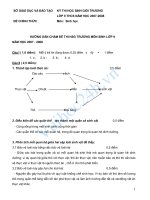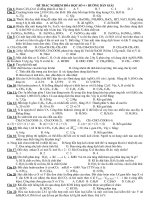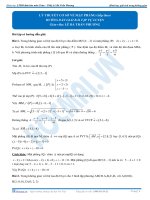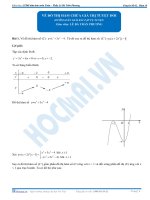ENGLISH 7 GLOBAL SUCCESS - ĐỀ SỐ 4 - HƯỚNG DẪN GIẢI
Bạn đang xem bản rút gọn của tài liệu. Xem và tải ngay bản đầy đủ của tài liệu tại đây (565.83 KB, 16 trang )
<span class="text_page_counter">Trang 1</span><div class="page_container" data-page="1">
<i><b>I. Choose the word whose underlined part is pronounced differently. </b></i>
<b>2. A. January </b> B. crystal C. hungry D. skyscraper
<i><b>II. Choose the word that has a different stressed syllable from the rest. </b></i>
<b>3. A. crowded </b> B. wealthy C. problem D. effect
<b>4. A. essential </b> B. memorial C. historic D. volunteer
<i><b>IIII. Choose the best option (A, B, C or D) to complete each of the following questions. </b></i>
<b>5. Mr. Smith is __________ old customer and __________ honest man. </b>
A. the – an B. an – the C. an – an D. the – the
<b>6. The narrow streets can’t __________ more traffic during rush hour. </b>
<b>7. My face looks like _______face. </b>
<b>8. Look at the boy! He is __________ a horse. </b>
<b>9. Wind is one type of __________ source of energy. </b>
A. renewable B. expensive C. dangerous D. exhaustible
<b>10. The music __________ louder and louder. Many people __________ their hands over their ears. </b>
A. is getting – put B. is getting – are putting C. gets – are putting D. gets – put
<b>11. The biggest ___________ for the winner is a trip to France. </b>
<b>12. A lot of people go to the city center to __________ the festival. </b>
<b>13. I go to school by bus every day. I don’t like it much, _________. </b>
<b>14. Critics were all __________ at their performance on the stage yesterday. A. disappointed </b> B. annoyed C. worried D. bored
<b>15. Always look __________ when you cross the street. </b>
<i><b>IV. Write the correct form of the words in brackets. </b></i>
<b>16. My father used to go __________ in the pond near our house. (FISH) ĐỀ THI HỌC KÌ 2 – ĐỀ SỐ 4 </b>
<b>MƠN: TIẾNG ANH 7 GLOBAL SUCCESS </b>
<b> BIÊN SOẠN: BAN CHUYÊN MÔN LOIGIAIHAY.COM </b>
</div><span class="text_page_counter">Trang 2</span><div class="page_container" data-page="2"><b>17. This is an __________ story for me. I can’t believe it. (BELIEVE) </b>
<b>18. __________ voluntarily contribute their money and other things to celebrate the festival together. </b>
(VILLAGE)
<b>19. Using public transport can reduce _________ . (POLLUTE) </b>
<b>20. The teachers is giving __________ to the difficult question. (EXPLAIN) </b>
<i><b>V. Read the passage and complete the following sentences with ONE or TWO words. </b></i>
The increased loss of the ecosystems including wetlands, wildlife, rainforests, coral reefs, aquatic life forms, and grasslands are highly influenced by overpopulation. It is out of overpopulation that activities such as excessive agriculture, environmental pollution, and extensive land development have become more and more intensive.
For example, rainforests originally covered 14% of the entire earth’s surface. Today, rainforests only cover about 6% of the earth’s surface and scientists forecast it may even become less in the next four decades judged by the current rate of vegetation removal, logging, and deforestation. Besides, due to environmental pollution, 30% of the ocean reefs have been lost because of acidification and global warming since 1980. Also, more than half of the original wetlands have been lost.
<b>21. The increased loss of the_________are highly influenced by overpopulation. 22. Excessive agriculture has become more and more_________. </b>
<b>23. _________of the entire earth’s surface was originally covered by rainforests. 24. Rainforests may cover less than 6% of the earth’s surface in the next_________. 25. Acidification and_________have made 30% of the ocean reefs disappear since 1980. </b>
<i><b>VI. Read and choose the best answer to fill in each blank. </b></i>
<b>Humans store energy in (26) __________ bodies, the earth stores the sun’s energy. The sun’s energy is stored </b>
in coal, natural gas, water and wind. Coal, oil, and natural gas are called fossil fuels. We use the energy in
<b>these fossil fuels to (27) __________ electricity. We use electricity in many different ways. We light and heat </b>
our homes, schools and businesses using electricity, and to run computers, refrigerators, washing machines,
<b>and air conditioners. Our cars and planes run (28) __________ gasoline, which comes from oil. By the year 2013, most of the energy we use comes from fossil fuels. (29) __________, fossil fuels are non-renewable </b>
sources of energy. They cannot be used over and over again. This means that one day they will run out! Luckily, there are some renewable energy sources we can use. Unlike non-renewable fossil fuels, they will not run out. Three forms of renewable fuels are solar (coming from the sun) energy, water energy and wind
<b>energy. All these renewable energy sources are (30) __________ for us because they will not run out, so we </b>
need to get better and better at using them.
<b>29. A. Therefore </b> B. Otherwise C. However D. As a result
</div><span class="text_page_counter">Trang 3</span><div class="page_container" data-page="3"><b>30. A. suitable </b> B. good C. healthy D. essential
<i><b>VII. Complete each of the following sentences using the cues given. You can change the cues and use other words in addition to the cues to complete the sentences. </b></i>
<b>31. People/ must/ aware/ effects/ overpopulation. </b>
<i><b>IX. Listen and decide if each statement is True or False. </b></i>
<b>36. Buses, subways, airplanes and trains are called private transports. 37. The subway is the most public transport used in big cities. </b>
<b>38. People don’t use bicycles much in China, Japan and India,… 39. In some double-decker buses, there are automatic doors. </b>
<b>40. Open top in buses allow passengers to see the places in London. </b>
<b>---THE END--- </b>
</div><span class="text_page_counter">Trang 4</span><div class="page_container" data-page="4"><b>HƯỚNG DẪN GIẢI </b>
<b>Thực hiện: Ban chuyên môn Loigiaihay.com </b>
2. D 7. B 12. B 17. unbelievable 22. intensive 27. A 37. True
4. D 9. A 14. A 19. pollution 24. four decades 29. C 39. True 5. C 10. B 15. C 20. explanation 25. global warming 30. D 40. True 31. People must be aware of the effects of overpopulation.
32. These modern means of transport help to save much time when travelling. 33. A lot of money is required to build a solar power plant.
34. It is originally launched to provide people with cosmetics using mud from the area. 35. Original name of the worldwide famous Mickey Mouse was Mortimer Mouse.
<b>HƯỚNG DẪN GIẢI CHI TIẾT 1. A </b>
<b>Kiến thức: Phát âm “s” Giải thích: </b>
A. noise /nɔɪz/ B. system /ˈsɪs.təm/ C. square /skweər/ D. service /ˈsɜː.vɪs/
Phần được gạch chân ở phương án A được phát âm /z/, các phương án còn lại phát âm /s/. Chọn A
<b>2. D </b>
<b>Kiến thức: Phát âm “y” Giải thích: </b>
A. January /ˈdʒæn.ju.ə.ri/ B. crystal /ˈkrɪs.təl/ C. hungry /ˈhʌŋ.ɡri/
A. crowded /ˈkraʊ.dɪd/ B. wealthy /ˈwel.θi/
</div><span class="text_page_counter">Trang 5</span><div class="page_container" data-page="5">C. problem /ˈprɒb.ləm/ D. effect /ɪˈfekt/
Phương án D có trọng âm 2, các phương án cịn lại có trọng âm 1. Chọn D
<b>4. D </b>
<b>Kiến thức: Trọng âm Giải thích: </b>
A. essential /ɪˈsen.ʃəl/ B. memorial /məˈmɔː.ri.əl/ C. historic /hɪˈstɒr.ɪk/ D. volunteer /ˌvɒl.ənˈtɪər/
Phương án D có trọng âm 3, các phương án cịn lại có trọng âm 2. Chọn D
<b>5. C </b>
<b>Kiến thức: Mạo từ Giải thích: </b>
<i>“old customer” (khách hàng cũ) và “honest man” (người đàn ông trung thực) là các cụm danh từ chưa được </i>
xác định cụ thể trong câu và bắt đầu bằng một nguyên âm =>ta dùng “an”
<b>Mr. Smith is an old customer and an honest man. </b>
<i>(Ông Smith là một khách hàng cũ và là một người đàn ông trung thực.) </i>
Chọn C
<b>6. C </b>
<b>Kiến thức: Từ vựng Giải thích: </b>
A. take (v): lấy
B. provide (v): cung cấp C. support (v): hỗ trợ D. carry (v): mang
<b>The narrow streets can’t support more traffic during rush hour. </b>
<i>(Các đường phố chật hẹp không thể hỗ trợ thêm lưu lượng truy cập trong giờ cao điểm.) </i>
Chọn C
<b>7. B </b>
<b>Kiến thức: Đại từ nhân xưng Giải thích: </b>
<i>A. she: cô ấy => chủ ngữ, đứng trước động từ </i>
<i>B. her: của cơ ấy => tính từ sở hữu, đứng trước danh từ </i>
</div><span class="text_page_counter">Trang 6</span><div class="page_container" data-page="6"><i>C. hers: (ai/ cái gì) của cơ ấy => đại từ sở hữu, đóng vai trị chủ ngữ hoặc tân ngữ </i>
<i>D. herself: chính cơ ấy => đại từ phản than, thường đứng cuối câu nhấn mạnh chủ thể thực hiện hành động Trước danh từ “face” (gương mặt) cần một tính từ sở hữu => dùng “her” </i>
<b>My face looks like her face. </b>
<i>(Khuôn mặt của tôi trông giống như khuôn mặt của cô ấy.) </i>
<b>Look at the boy! He is riding a horse. </b>
<i>(Nhìn cậu bé kìa! Anh ấy đang cưỡi ngựa.) </i>
Chọn B
<b>9. A </b>
<b>Kiến thức: Từ vựng Giải thích: </b>
A. renewable (adj): có thể tái tạo B. expensive (adj): mắc tiền C. dangerous (adj): nguy hiểm D. exhaustible (adj): có thể cạn kiệt
<b>Wind is one type of renewable source of energy. </b>
<i>(Gió là một loại nguồn năng lượng tái tạo.) </i>
<i>“music” (âm nhạc) là chủ ngữ số ít => is + Ving </i>
<i>“people” (mọi người) là chủ ngữ số nhiều => are + Ving </i>
<b>The music is getting louder and louder. Many people are putting their hands over their ears. </b>
</div><span class="text_page_counter">Trang 7</span><div class="page_container" data-page="7"><i>(Âm nhạc ngày càng to hơn. Nhiều người đang đưa tay bịt tai.) </i>
Chọn B
<b>11. C </b>
<b>Kiến thức: Từ vựng Giải thích: </b>
A. part (n): phần B. benefit (n): lợi ích C. prize (n): giải thưởng D. mark (n): điểm
<b>The biggest prize for the winner is a trip to France. </b>
<i>(Giải thưởng lớn nhất dành cho người chiến thắng là một chuyến du lịch đến Pháp.) </i>
Chọn C
<b>12. B </b>
<b>Kiến thức: Từ vựng Giải thích: </b>
A. have (v): có B. attend (v): tham dự C. relax (v): thư giãn D. discuss (v): thảo luận
<b>A lot of people go to the city center to attend the festival. </b>
<i>(Rất đông người dân đổ về trung tâm thành phố để tham dự lễ hội.) </i>
Chọn B
<b>13. C </b>
<b>Kiến thức: Từ vựng Giải thích: </b>
A. despite + N/ V-ing: mặc dù B. although + S + V: mặc dù C. however: tuy nhiên
D. but: nhưng
<b>I go to school by bus every day. I don’t like it much, however. </b>
<i>(Tôi đi học bằng xe buýt mỗi ngày. Tuy nhiên, tơi khơng thích nó lắm.) </i>
Chọn C
<b>14. A </b>
<b>Kiến thức: Từ vựng Giải thích: </b>
A. disappointed + at sth (adj): thất vọng
</div><span class="text_page_counter">Trang 8</span><div class="page_container" data-page="8">B. annoyed + at sth (adj): khó chịu
C. worried + about sth (adj): lo lắng D. bored + with sth (adj): chán
<b>Critics were all disappointed at their performance on the stage yesterday. </b>
<i>(Các nhà phê bình đều thất vọng về màn trình diễn của họ trên sân khấu ngày hôm qua.) </i>
Chọn A
<b>15. C </b>
<b>Kiến thức: Từ vựng Giải thích: </b>
A. quickly (adv): nhanh B. well (adv): tốt
C. carefully (adv): cẩn thận D. safely (adv): an toàn
<b>Always look carefully when you cross the street. </b>
<i>(Luôn quan sát cẩn thận khi bạn băng qua đường.) </i>
Chọn C
<b>16. fishing </b>
<b>Kiến thức: Từ vựng – Từ loại Giải thích: </b>
Sau động từ “go” cần một động từ ở dạng V-ing. Cụm động từ “go fishing”: đi câu cá
<b>My father used to go fishing in the pond near our house. </b>
<i>(Bố tôi thường đi câu cá ở cái ao gần nhà chúng tôi.) </i>
Đáp án: fishing
<b>17. unbelievable </b>
<b>Kiến thức: Từ vựng – Từ loại Giải thích: </b>
<i>Trước danh từ “story” (câu chuyện) cần một tính từ. </i>
believe (v): tin
=> believable (adj): đáng tin
=> unbelievable (adj): không đáng tin
<b>This is an unbelievable story for me. I can’t believe it. </b>
<i>(Đây là một câu chuyện khó tin đối với tơi. Tơi khơng thể tin được.) </i>
Đáp án: unbelievable
<b>18. villagers </b>
<b>Kiến thức: Từ vựng – Từ loại </b>
</div><span class="text_page_counter">Trang 9</span><div class="page_container" data-page="9"><b>Giải thích: </b>
<i>Trước động từ “contribute” (đóng góp) cần một danh từ số nhiều đóng vai trị là chủ ngữ. </i>
village (n): ngôi làng => villagers (n): dân làng
<b>Villagers voluntarily contribute their money and other things to celebrate the festival together. </b>
<i>(Dân làng tự nguyện đóng góp tiền của và các vật dụng khác để cùng nhau tổ chức lễ hội.) </i>
Đáp án: villagers
<b>19. pollution </b>
<b>Kiến thức: Từ vựng – Từ loại Giải thích: </b>
<i>Sau động từ “reduce” (cắt giảm) cần một danh từ để tạo thành câu có nghĩa. </i>
pollute (v): gây ô nhiễm => pollution (n): sự ô nhiễm
<b>Using public transport can reduce pollution. </b>
<i>(Sử dụng phương tiện giao thông cơng cộng có thể làm giảm ơ nhiễm.) </i>
Đáp án: pollution
<b>20. explanation </b>
<b>Kiến thức: Từ vựng – Từ loại Giải thích: </b>
<i>Sau động từ “giving” (đưa) cần một danh từ để tạo thành câu có nghĩa. </i>
explain (v): giải thích => explanation (n): giải thích
<b>The teacher is giving explanation to the difficult question. </b>
<i>(Giáo viên đang đưa ra lời giải cho câu hỏi khó.) </i>
Đáp án: explanation
<b>21. ecosystems Kiến thức: Đọc hiểu Giải thích: </b>
Sau mạo từ “the” cần một danh từ ecosystems (n): hệ sinh thái
<b>The increased loss of the ecosystems is highly influenced by overpopulation. </b>
<i>(Sự mất mát ngày càng tăng của các hệ sinh thái bị ảnh hưởng nặng nề bởi quá tải dân số.) </i>
<b>Thông tin: The increased loss of the ecosystems including wetlands, wildlife, rainforests, coral reefs, </b>
aquatic life forms, and grasslands are highly influenced by overpopulation.
<i>(Sự mất mát ngày càng tăng của các hệ sinh thái bao gồm vùng đất ngập nước, động vật hoang dã, rừng nhiệt đới, rạn san hô, các dạng sống dưới nước và đồng cỏ chịu ảnh hưởng lớn của dân số quá mức.) </i>
Đáp án: ecosystems
<b>22. intensive </b>
<b>Kiến thức: Đọc hiểu </b>
</div><span class="text_page_counter">Trang 10</span><div class="page_container" data-page="10"><b>Giải thích: </b>
<i>Sau động tư “become” (trở nên) cần một tính từ. </i>
intensive (adj): nghiêm trọng
<b>Excessive agriculture has become more and more intensive. </b>
<i>(Nền nông nghiệp quá mức ngày càng nghiêm trọng.) </i>
<b>Thông tin: It is out of overpopulation that activities such as excessive agriculture, environmental pollution, </b>
and extensive land development have become more and more intensive.
<i>(Chính vì dân số q đơng mà các hoạt động như nông nghiệp quá mức, ô nhiễm môi trường và phát triển đất đai ngày càng trở nên nghiêm trọng.”) </i>
Đáp án: intensive
<b>23. 14% </b>
<b>Kiến thức: Đọc hiểu Giải thích: </b>
Thơng tin cần nghe là một con số.
<b>14% of the entire earth’s surface was originally covered by rainforests. </b>
<i>(14% toàn bộ bề mặt trái đất ban đầu được bao phủ bởi rừng nhiệt đới.) </i>
<b>Thông tin: rainforests originally covered 14% of the entire earth’s surface. </b>
<i>(rừng nhiệt đới ban đầu bao phủ 14% toàn bộ bề mặt trái đất.) </i>
Đáp án: 14%
<b>24. four decades Kiến thức: Đọc hiểu Giải thích: </b>
Sau mạo từ “the” cần một danh từ. four decades: bốn thập kỉ
<b>Rainforests may cover less than 6% of the earth’s surface in the next four decades. </b>
<i>(Rừng nhiệt đới có thể bao phủ ít hơn 6% bề mặt trái đất trong bốn thập kỷ tới.) </i>
<b>Thông tin: scientists forecast it may even become less in the next four decades judged by the current rate of </b>
vegetation removal, logging, and deforestation.
<i>(các nhà khoa học dự báo nó thậm chí có thể trở nên ít hơn trong bốn thập kỷ tới được đánh giá bởi tốc độ loại bỏ thảm thực vật, khai thác gỗ và phá rừng hiện nay.) </i>
Đáp án: four decades
<b>25. global warming Kiến thức: Đọc hiểu Giải thích: </b>
<i>Trước động từ “have” (có) cần một danh từ đóng vai trị làm chủ ngữ. </i>
global warming (n): nóng lên tồn cầu
</div><span class="text_page_counter">Trang 11</span><div class="page_container" data-page="11"><b>Acidification and global warming have made 30% of the ocean reefs disappear since 1980. </b>
<i>(Quá trình axit hóa và sự nóng lên tồn cầu đã khiến 30% rạn san hô ở đại dương biến mất kể từ năm 1980.) </i>
<b>Thông tin: Besides, due to environmental pollution, 30% of the ocean reefs have been lost because of </b>
acidification and global warming since 1980.
<i>(Bên cạnh đó, do ơ nhiễm môi trường, 30% rạn san hô ở đại dương đã biến mất do q trình axit hóa và nóng lên toàn cầu kể từ năm 1980.) </i>
Đáp án: global warming
<b>26. D </b>
<b>Kiến thức: Từ vựng Giải thích: </b>
A. his: của anh ấy B. her: của cô ấy C. their: của họ D. our: của chúng ta
<b>Humans store energy in our bodies, the earth stores the sun’s energy. </b>
<i>(Con người lưu trữ năng lượng trong cơ thể chúng ta, trái đất lưu trữ năng lượng của mặt trời.) </i>
Chọn D
<b>27. A </b>
<b>Kiến thức: Từ vựng Giải thích: </b>
A. make (v): làm ra B. cause (v): gây ra C. do (v): làm D. run (v): chạy
<b>We use the energy in these fossil fuels to make electricity. </b>
<i>(Chúng ta sử dụng năng lượng trong các nhiên liệu hóa thạch này để tạo ra điện.) </i>
Chọn A
<b>28. A </b>
<b>Kiến thức: Giới từ Giải thích: </b>
A. by: bởi B. on: trên C. with : với D. in: trong
<b>Our cars and planes run on gasoline, which comes from oil. </b>
</div><span class="text_page_counter">Trang 12</span><div class="page_container" data-page="12"><i>(Xe ô tô và máy bay của chúng ta chạy bằng xăng, thứ có nguồn gốc từ dầu mỏ.) </i>
Chọn B
<b>29. C </b>
<b>Kiến thức: Từ vựng Giải thích: </b>
A. Therefore: do đó B. Otherwise: nếu không C. However: tuy nhiên D. As a result: kết quả là
<b>By the year 2013, most of the energy we use comes from fossil fuels. However, fossil fuels are </b>
non-renewable sources of energy.
<i>(Đến năm 2013, hầu hết năng lượng chúng ta sử dụng đến từ nhiên liệu hóa thạch. Tuy nhiên, nhiên liệu hóa thạch là nguồn năng lượng không thể tái tạo.) </i>
Chọn C
<b>30. D </b>
<b>Kiến thức: Từ vựng Giải thích: </b>
A. suitable (adj): phù hợp B. good (adj): tốt
C. healthy (adj): lành mạnh D. essential (adj): thiết yếu
<b>All these renewable energy sources are essential for us because they will not run out, so we need to get </b>
better and better at using them.
<i>(Tất cả những nguồn năng lượng tái tạo này đều cần thiết cho chúng ta vì chúng sẽ khơng cạn kiệt, vì vậy chúng ta cần ngày càng sử dụng chúng tốt hơn.) </i>
Chọn D
<b>Bài đọc hoàn chỉnh: </b>
<b>Humans store energy in (26) our bodies, the earth stores the sun’s energy. The sun’s energy is stored in coal, </b>
natural gas, water and wind. Coal, oil, and natural gas are called fossil fuels. We use the energy in these fossil
<b>fuels to (27) make electricity. We use electricity in many different ways. We light and heat our homes, schools </b>
and businesses using electricity, and to run computers, refrigerators, washing machines, and air conditioners.
<b>Our cars and planes run (28) by gasoline, which comes from oil. By the year 2013, most of the energy we use comes from fossil fuels. (29) However, fossil fuels are non-renewable sources of energy. They cannot be used </b>
over and over again. This means that one day they will run out! Luckily, there are some renewable energy sources we can use. Unlike non-renewable fossil fuels, they will not run out. Three forms of renewable fuels
</div>








